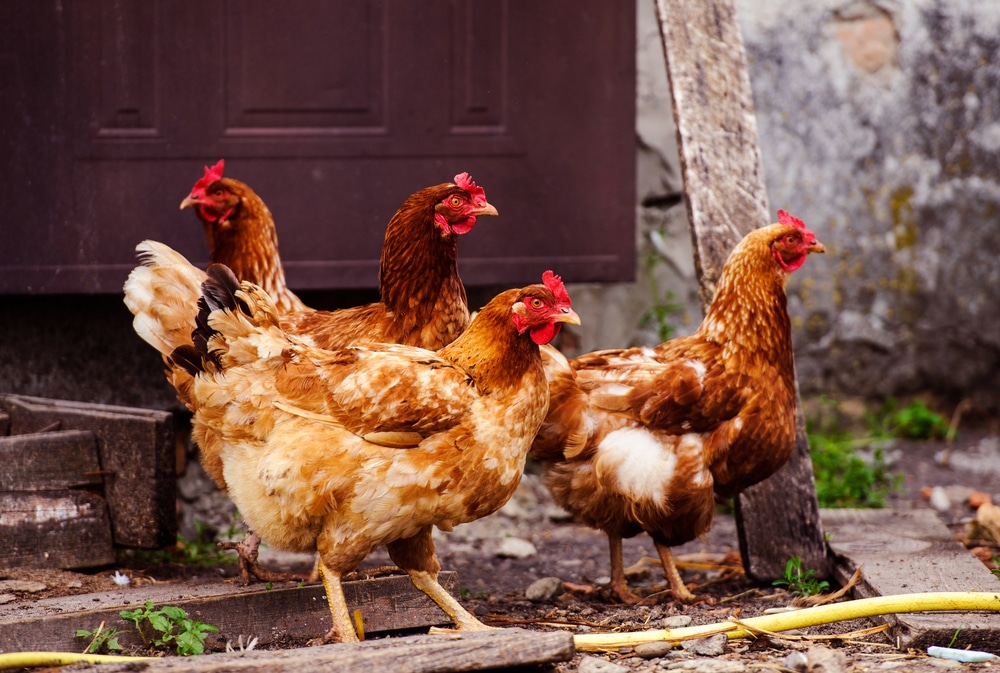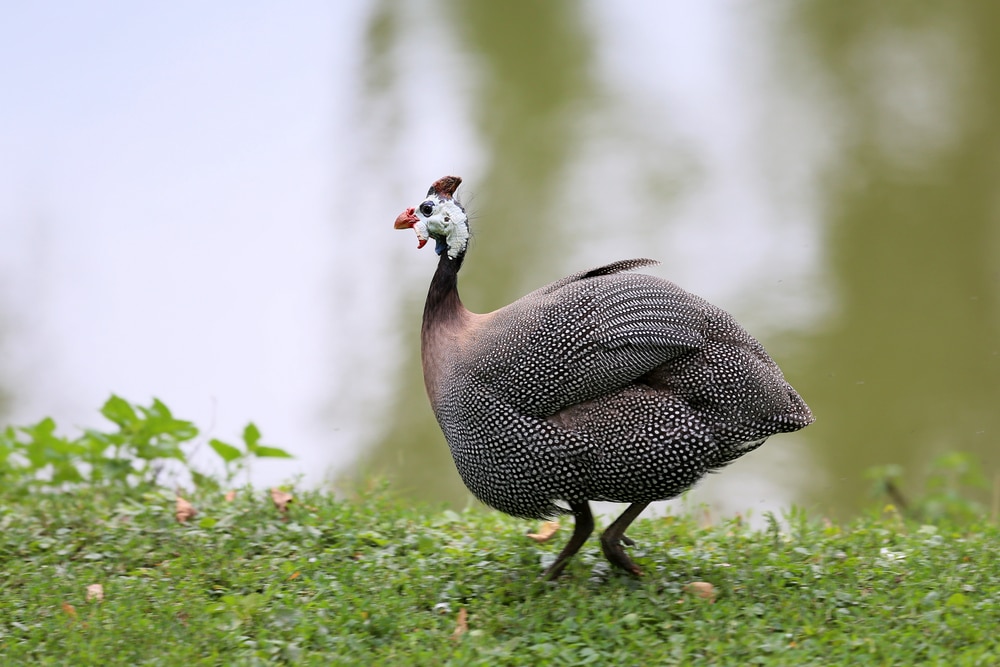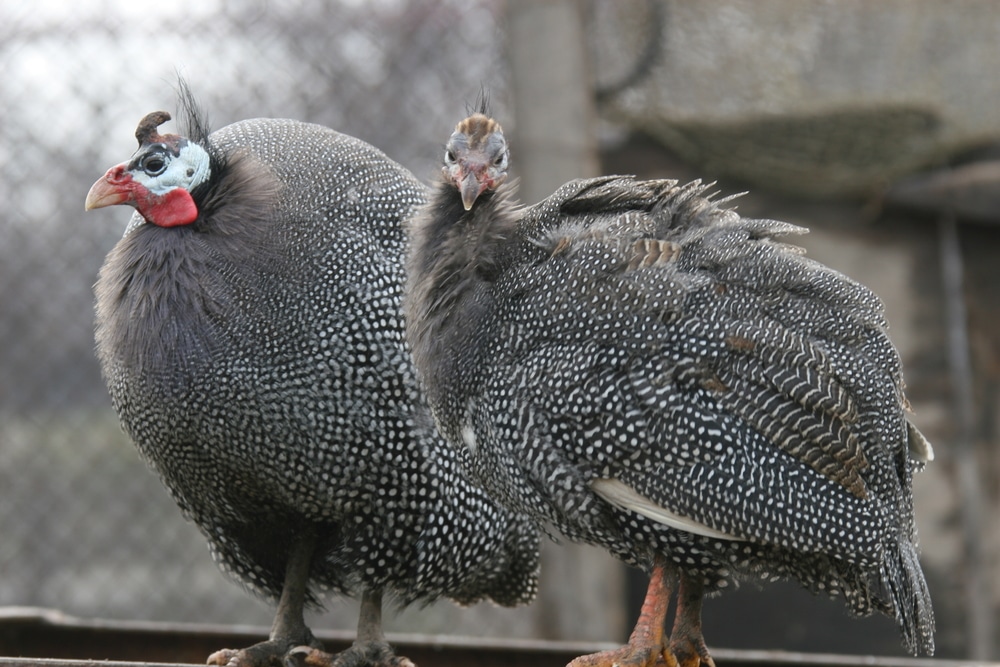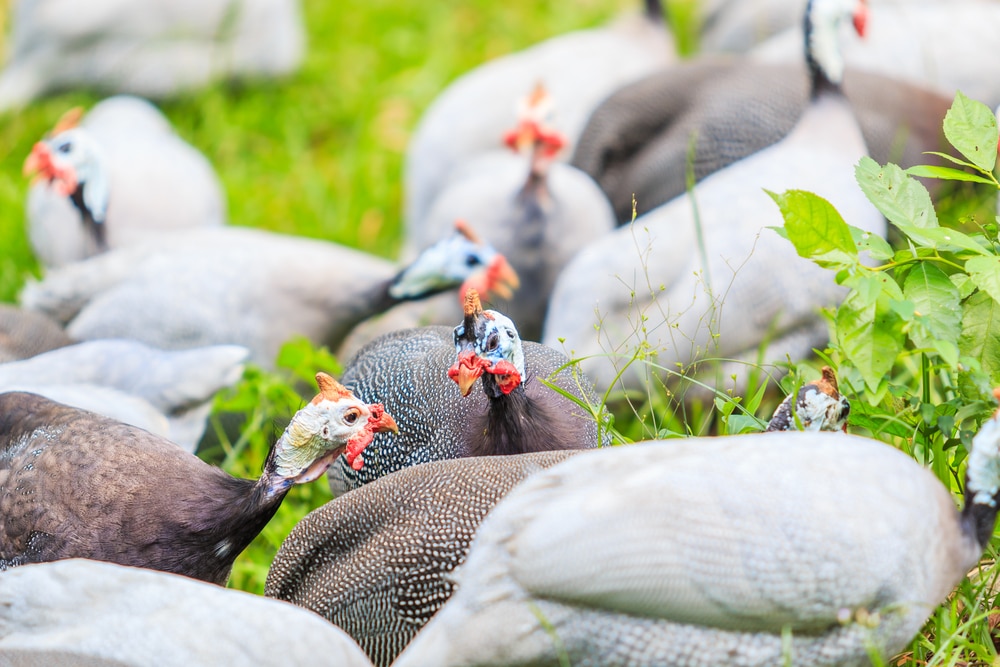When adding farm animals to your household, the first one that comes to mind is chickens. It is becoming popular to set up a coop in your backyard and have fresh eggs. They are easy to raise and a great choice to get started in self-sufficiency. Chickens are not the only bird to raise. Ducks, turkeys, geese, and guinea hens are all good choices.
Let’s chat about guinea hens as they are pretty similar to chickens. Many people raise them for eggs, a meat source, insect control, or as a farm watch animal.
Guinea fowl were brought to America from their native Africa by early settlers. Today, there are three main species of this game bird available. The information contained here is general to any breed of guinea fowl.
Chickens vs Guinea Hens: Which Bird is Best?
As you decide on chickens or guinea fowl, there are some questions to ask yourself. As mentioned, there are some similarities between the two birds, but there are some distinct differences as well.
Start by looking at your space. Do you have a smaller backyard or many acres? Do you live in an urban area or down a country road? If you are limited in space, chickens might be a better choice. They are easier to contain and fairly quiet. Guinea hens are loud and can fly, so check to see if your zoning even allows guinea hens. If you have close neighbors, this should factor into your decision making process.
Consider your purpose for raising each bird. Both chickens and guineas lay eggs. Both can be raised for their meat. Guinea hens produce a leaner, gamier type of meat.
So, let’s move on to the positives and negatives of each bird.
The Good about Raising Chickens
Chickens are a great starter bird for a homestead. They can be kept in smaller spaces, don’t make much noise (unless you have a rooster), and are fairly easy to care for. Give them food, water, a clean, safe place to roost and a yard to dig around in and they will provide you with eggs for quite a while.
Chickens can’t fly very far, so they tend to stick close to home even when they are free-ranging. They eat bags of chicken feed, and a lot of kitchen scraps. Add mealworms for a treat and oyster shells for a calcium supplement and you create happy birds with healthy eggs. They will dig for bugs and eat grass and weeds. You can compost their old bedding and the scraps they don’t eat for nutrient filled garden soil.
If your zoning allows roosters, you can gather and incubate some of the eggs to continue your flock or to raise for meat.
Chickens also get along with most other animals.

Challenges of Raising Chickens
Chickens are vulnerable and need to be protected. Chickens should be watched around dogs, cats, and pigs if you have some on your homestead. Hawks, mountain lions, raccoons, bears, and fox will not hesitate to pluck a meal from your flock given the opportunity.
If you have a large yard and free-range the chickens, you can put them in the fields with goats, horses, donkeys, or sheep who will provide protection. Alternatively, you can put a cage behind a tractor and move it periodically for variety in their space, or you can build a large pen with protection on the bottom, top and sides. This may be a trial and error process. Hungry predators are determined to find any vulnerabilities in the coop, so check often for breaches and patch holes promptly.
Chickens tend to scratch and dig holes. If you let them free range in your garden, they might eat the veggies and scratch up the plants in their quest for bugs or a dirt bath. I planted a patch of catnip for the kitties and they actually dug it up and ate it. You will want to keep flowers, and other plants out of their reach.
Chickens are quite messy if kept in confined spaces, so clean the coop often to protect the chickens from diseases. Chickens are vulnerable to rodents as well, and mice are very hard to keep out of cages. A sonic mouse repeller or outdoo cat can help with this problem. Cats and chickens generally get along well.
Every so often, your chickens will be under the weather. Having a handy place to isolate one from the flock is a good idea to prevent any spread of infections.
Raising Guinea Hens
There are some distinct differences between raising guinea hens and raising chickens. Guinea hens, like chickens, can be raised from birth. You can buy fertilized eggs and put them in the incubator, or you can purchase hatched babies called keets. Chicks and keets can be raised together, but they do require different nutrition – chick starter for the chicks and game bird starter for the keets.
As the keets and chicks grow, they will exhibit different behaviors that you need to take in to consideration. They can both be free-range if you have room to roam. In fact, guinea hens do better when free-ranging. Chickens can’t fly very far and tend to stay closer to home. Guinea hens on the other hand want to wander and can take flight into trees.
Like chickens, guinea hens should be provided with a shelter, food, a water source, and nesting boxes. There are differences in the shelter and nutrition, so do some homework when choosing housing options.

Free-range vs Cages
You can keep guinea hens in an enclosed space if you clip their wings and use bird netting over the area. You can also use a tractor with an enclosed area that you can move from spot to spot to keep them engaged, but chickens and guineas are happier and more useful free-ranging.
Chickens are fairly easy to round up at the end of the day and most come back to their water and food source, but guinea fowls may be a little more difficult.
Guineas need to be trained to come back home. This starts with keeping them penned up for a while and slowly releasing them, so the flock knows where to return. Keeping food and water in a set area may help, but guinea hens have a mind of their own. They will wander across the street, into the neighbor’s yard, roost up in trees, or climb on your roof.
Advantages of Guinea Hens
If you have the space for raising guinea hens, they have distinct advantages over chickens. First, they are amazing alarms. Guinea hens make A LOT of noise. Because of this and their tendency to wander, they are probably not allowed or recommended in urban areas.
Unless your neighbors are VERY understanding, they may be annoyed with hens wandering in their yard or squawking at every little thing. But if you live in an isolated area, guinea hens will warn you of anything out of the ordinary – a delivery driver, wild animals in the area, and more.

Guinea hens are great for keeping the bug population down. Their favorite meals are ticks, June bugs and any other little annoying critter flying or crawling around. You can save lots of money on feed if there are plenty of bugs for your hens to chase. This is an advantage if you have pests in your gardens as well as they will not tear up your crops.
Guinea hens can kill larger creatures as well. These tough little birds take on snakes and mice.
If you have guinea hens and chickens roaming together, the guinea hens will act as protection for the flock by causing a fuss if hawks or other animals wander too close. This includes stray domestic dogs or wandering cats as well.
Guinea hens are more low-maintenance than chickens. They are generally disease-free. They can roost in the trees or sleep anywhere outside as long as it’s not too cold. Provide them with a clean shelter when the weather turns chilly or stormy. If you keep them inside, make sure their house is well ventilated. Guinea hens do not do well when kept in a very humid area.
Keep water available. Otherwise the guinea hens will go in search of it and wander too far. Make sure they have a welcoming place to come back to and they will.
Guinea hens can be raised for eggs or as a source of meat.
Challenges of Raising Guinea Hens
We’ve already mentioned a few of the challenges of raising guinea hens. The first is the noise. If you have neighbors close by, they may not be a good choice. They call to each other while hunting and they make a lot of noise for any reason. It may take a little getting used to the chatter.
The second challenge is keeping them contained. If you want birds that come home happily and stick around, choose chickens over guinea hens. If you live near a road or other hazards, you will drive yourself crazy with worry.
Breeding Guinea Hens
This is neither a negative nor a positive, but just information you should know if you decide to breed your guineas.
You can tell male and female guineas hens apart by the sound they make. The hens sound like they are saying “Come back. Come back.” The males make a “Chi chi chi” noise. If you have roosters, you will no doubt have a chance of breeding baby guineas.
This can be a little challenging due to the behavior of the mommas. They could nest in the ground even if you provide nesting boxes, which may make the eggs difficult to find. The guinea hens will sit on the eggs just fine, but once the little keets hatch, they consider their job done. The babies want to follow mom and could get into trouble easily, because the hens aren’t necessarily paying close attention.
There are ways to get around this issue: find the eggs and put them in an incubator or find the eggs and put them under a broody hen, who will be a happy surrogate mother.
Can I have both Chickens and Guinea Hens?
Of course! They get along pretty well as long as they are not cooped up together for long periods of time. Guinea hens with their loud mouths act as protectors from predators. Between the two species, your land will be bug, snake, and mouse free!
It is a good idea to provide a different food source and shelter. Chickens need more shelter protection so their space should be well thought out. In a pinch, guinea hens could be put into the chicken house on a temporary basis, but this is not recommended for the longer term.
Guinea hens can be bullies, chasing and pecking the chickens, and taking over the spaces. If they have a lot of space to free-range, chickens can steer clear, but in a smaller space, chickens can get hurt or experience too much stress.
If you plan on breeding your chickens, you will want to separate them from the guinea hens. They can cross-breed, but when the new chickens are born, they will not be able to lay eggs for reproduction. Besides a strong headed rooster and guinea hens in a smaller space are asking for trouble.
Choosing your Birds
Now that you know the positives and negatives of chickens and guinea hens, you can decide which is best for your homestead. They both provide eggs and are both great for meat sources.
Chickens are popular, especially in the cities, and there is a lot of information about setting up coops and taking care of hens. Guineas require more research and thought.
Expanding your flock, or choosing guinea hens as an alternative to chickens, is definitely something to check into. Depending on your situation, guinea hens might be right for you. Just do your homework and know what to expect before making the decision. Otherwise you might get a headache from their chatter, spend time worrying about their behavior, end up chasing them for miles, and may need to make tough decisions about finding them a new home.
